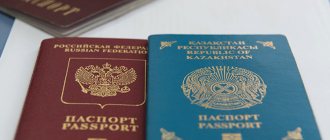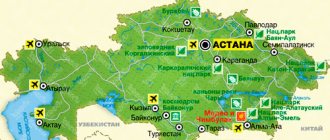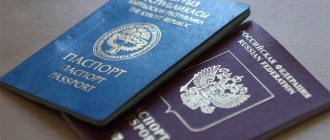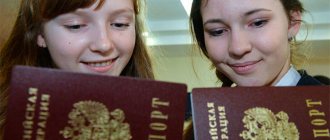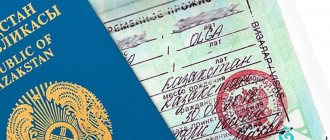How to enter Russia from Kazakhstan today
Today, a citizen of Kazakhstan can enter Russia from Kazakhstan by direct flight. To do this, you must have an identification document, as well as a PCR test for coronavirus, displayed in the “Travel without COVID-19” mobile application. In this case, it is not necessary to present documents confirming the reasons for entry into Russia.
As for the land border, it is still possible to enter Russia from Kazakhstan only if there are grounds for entry provided for by Decree of the Government of the Russian Federation No. 635 r.
Legalization procedure
Having arrived in the Russian Federation, a citizen with permission to leave Kazakhstan must, within 3-7 days, submit an application to the Federal Migration Service of Russia for a temporary residence permit.
To do this, you must provide the following to the migration service department at your place of stay:
- application form;
- two photographs 35 by 45 mm;
- identification document of the applicant;
- marriage certificate (divorce), birth certificate of each moving child, etc.;
- a medical examination certificate confirming the absence of dangerous diseases, including drug addiction;
- migration card;
- confirmation of financial solvency;
- a document on the basis of which the applicant has the right to use the housing specified in the application, where it will be registered in the future.
- a certificate confirming that the applicant has no criminal record, issued earlier than 3 months on the day of filing the application for a permit;
- certificate confirming that the applicant does not have a disease caused by the human immunodeficiency virus (HIV infection).
- a document confirming the foreign citizen’s command of the Russian language, knowledge of the history of Russia and the fundamentals of the legislation of the Russian Federation.
You can find a complete list of necessary documentation to obtain a residence permit in the Russian Federation here.
The duration of the procedure for making a decision on issuing a temporary residence permit can take up to 60 days.
Resident card
Before receiving a residence permit, a foreign citizen is required to live in the Russian Federation for at least one year on the basis of a temporary residence permit. If a migrant uses the full period of stay under a temporary residence permit, it is necessary to apply for a residence permit one month before the expiration of the three-year period.
The list of documents for obtaining a residence permit is similar to the list of documents for a temporary residence permit, except for some items. Additionally served:
- application for a residence permit (in two copies);
- a document confirming the existence of a legal source of livelihood that allows one to support oneself in the Russian Federation within the subsistence level, or a document confirming the applicant’s incapacity for work;
- a document confirming the availability of residential premises; appears to be a foreign citizen applying after 3 years from the date of entry into the Russian Federation.
With a residence permit, you are allowed to reside on the territory of the Russian Federation for 5 years. Then it is possible either to extend the residence permit for another 5 years, or to acquire Russian citizenship.
Is it possible now to enter Russia from Kazakhstan to visit or study?
Now you can enter Russia from Kazakhstan to visit or study only by direct flights, which have been open between the countries since September last year.
As mentioned above, you must have a passport and a PCR test for coronavirus with you, displayed in the “Travel without COVID-19” mobile application.
You cannot enter Russia from Kazakhstan to visit or study through the land border. A trip to visit or study is not a reason for entering Russia through land checkpoints.
Registration of citizens of Kazakhstan in Russia
Once you arrive in the country, the fun begins. First of all, you need to pass MU (migration registration). This procedure means that the owner of the apartment registers you at a specific address. And here the settlers face certain difficulties. For example, they may not be satisfied with the conditions of an apartment or house whose owner is ready to officially register it. In this case, as experienced migrants say, you can live in one place and be registered in another. Of course, it’s better not to tell anyone about this.
It is also important for displaced people to understand that not all people renting housing will agree to register them. However, those who want to do this can be found by posting an advertisement on any bulletin board. The main thing is not to pay a deposit or advance in advance. You will have to pay extra for official registration. According to reviews, this is at least a thousand rubles per month per person.
So, when you have found a homeowner who is ready to register you, go with him to the MFC and fill out the necessary forms. After this, the migrant receives a tear-off slip, which indicates migration registration.
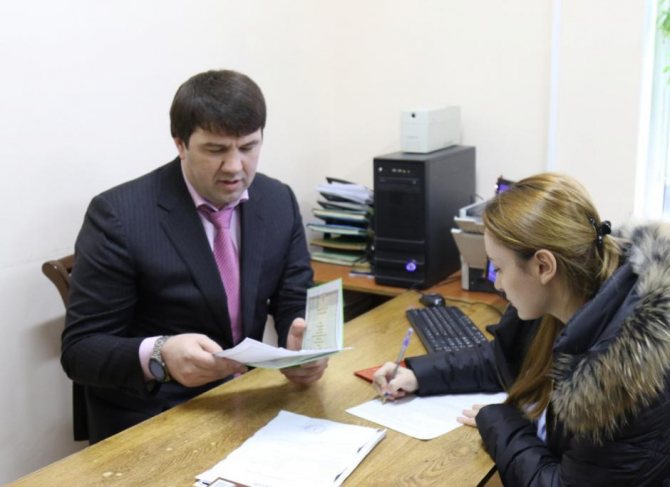
Once you have decided on the place of registration, you should go to the Federal Migration Service (district or regional) and activate the migrant’s book. When the inspector enters the necessary information and puts a stamp, you can collect documents for issuing a temporary residence permit.
What is needed for this? In addition to collecting certain papers, you will need to undergo a medical examination and receive a special certificate about this. Once the documents are collected, they must be submitted. An unpleasant surprise awaits many displaced people here, namely a huge queue for submitting papers to the temporary residence permit.
Remember: registration of citizens of Kazakhstan in Russia under the program for the return of compatriots implies an extraordinary submission of documents for a temporary residence permit. That is, migrants have the right to apply for a temporary residence permit without waiting lists or quotas. Only refugees are given priority, then migrants come, and only then migrant workers and others.
To work
Currently, if they have an identification document, as well as a coronavirus test displayed in the “Travel without COVID-19” mobile application, a citizen of Kazakhstan can enter Russia for work by direct flight. No other documents are required to be presented. It is enough to highlight on the migration card when crossing the border the purpose of entry – “work”.
At the same time, people will be allowed to work in Russia through land checkpoints only in exceptional cases, provided for by Order of the Government of the Russian Federation No. 635 r.
Solving matters at home
As mentioned above, you should notify the government of Kazakhstan that you are planning to leave the country. To do this, the migrant must contact the migration police to be discharged and notify the state of his future plans. Permission to leave the Republic of Kazakhstan will need to be waited for thirty days.
Then the men will need to be removed from the military register. In this regard, they receive a certain document (or certificate) of a special sample.
When will the land border between Russia and Kazakhstan open?
It is unknown when the land border between Russia and Kazakhstan will open. There is no official information on this issue. We hope that by summer all restrictions on crossing the land border between Russia and Kazakhstan will be lifted, and citizens will be able to travel, visit, study, or work in a neighboring country not only by air, but also by car or train.
Also read:
Is it possible for a foreigner to enter Russia today: the latest changes in the rules for entry into the Russian Federation Read more >>>
Entry into Russia from February 1 for citizens of EAEU countries: what has changed and how to arrive Read more >>>
“When you go to Russia for permanent residence, know what awaits you there...”
Hundreds and thousands of stories related to this seemingly simple process, which has been going on for more than two decades, have apparently reached the authorities of this country. Here they are finally talking about a new migration policy. But when will these yet-to-be-released laws come into effect and will they make the situation easier for our compatriots?
At the start - everything is simple
Here is just one of these many thousands of stories of people who decided to leave the former Soviet republics and move to the Russian Federation. We won’t talk about the reasons, but the main one is still quite clear - the call of the blood, the desire to live in the country of your ancestors and native language.
Having made this decision, the Zaripovs were relieved to learn that since they were born in Russia, they had some advantages. The procedure for completing all procedures and statuses is the same for everyone, but the time between successive receipt of the main statuses - temporary residence permit, residence permit and acquisition of citizenship - is significantly reduced.
Vaccination without an antibody test is dangerous 04/07/2021 13:002110
“There was one more plus at the start. After hanging around in queues at the Russian Consulate in Almaty for a month and a half (this was in January 2014), we submitted our documents. And six months later, having moved to St. Petersburg, we received a temporary residence permit, which saved us several months of waiting. This was the first stage of the journey to a Russian passport,” says Svetlana Zaripova.
Bureaucracy in action
Then everything was much more painful. The queues at the regional FMS office were simply fantastic. It was necessary to occupy them late in the evening or early in the morning, sign up with some vague individuals who were on duty at the doors of the regional migration service, weeks or a month in advance, report daily, and then, when the deadline arrived, stand for several hours in the offices to hand over the documents . Those who stood in line for a long time in cramped corridors exchanged experiences, shared information and their emotions about the difficulties of moving.
“During this time, I have never seen that anyone was lucky enough to pass the documents on the first try. Although a list of all the necessary certificates and questionnaires could be found on the website or service stands, it was impossible to fill them out correctly. What nuances were not cleared up when submitting all these papers! – recalls Svetlana. “At the reception, the inspector made a lot of comments and amendments, especially in the application. Having corrected everything, the next time (and because of the long queues it could only come in a month or two) you went to another inspector and he made new comments, demanded additional certificates, which the previous employee did not mention on your first visit. This is just incredible horror!
One of the unexpected requirements, for example, is the translation into Russian of the text of the passport of a citizen of Kazakhstan, birth certificates, diplomas of graduation from a Russian-language school, and stamps in documents. And this despite the fact that the second page of the Kazakh passport is filled out in Russian, as other documents and stamps on them are translated. But the translation had to be done and certified by a notary.
Black shadows of green energy. End 03/31/2021 11:003436
I was struck by the high ranks of FMS employees who performed fairly simple duties of accepting documents. Majors, lieutenant colonels, colonels... The state, of course, knows best, but what costs does it incur where everything could be made more transparent, simpler, more accessible and cheaper.
A little later, all district services of St. Petersburg and the Leningrad region were united into one migration center. There it was especially clearly visible how many people had come for permanent residence to the northern capital of five million and the region of almost two million and were eager to receive a Russian passport.
Only two hundred people were accepted per day, but there were many more who wanted to get a ticket to see the inspector. People stood on the street for several hours to be the first to enter after the opening. The building is of impressive size, there are separate halls and even benches for those waiting for seemingly good changes. But in the offices everything remained the same. In addition to the endless alterations of documents and certificates, the many-day waits for the next visits, the attitude of the officials was depressing, indifferent, rude, to whom they seemed to say the notorious: “Here we come in large numbers!”
“In 2015, we finally submitted our documents and six months later received a residence permit. The wait for citizenship was supposed to take another year, but it lasted much longer due to the same queues and bureaucratic ordeals in offices. One year, I note, is the official period for those born in Russia. Those Russians who were born in other republics of the former Soviet Union need to wait five years!” says Svetlana Zakirova.
Absurdity and shadow business
Coronavirus crisis and rally against Chinese expansion 03/29/2021 14:004735
The Zakirovs calculated that they spent more than three years on the entire process from the beginning of applying to the Russian Consulate in Almaty to receiving a passport with registration! And all this time they did not even try to look for work - firstly, they had to deal with all the stages of obtaining citizenship, and secondly, without citizenship it is problematic to find a job. The employer needs to obtain special permission to hire you, and this is troublesome. We are not talking about employing a whole team of builders from another republic, for example, but about just one person.
“During this time, we have aged another three years and now, even though we have a passport, we are not very much in demand on the labor market due to our age,” Svetlana saddens.
Now she understands why obtaining citizenship for young people takes many years - they need to work, it’s difficult to endlessly ask for time off to visit the migration service. That’s why some people don’t have a passport even after ten years of living in Russia, while others are forced to turn to the shadow side of acquiring a red-skinned book.
“The clandestine acquisition of citizenship for a lot of money in Russia is quite developed, as evidenced by frequent reports on major TV channels. But we, as law-abiding citizens, did not take this path, and we were sure that our homeland would cordially open its arms to our compatriots,” says Svetlana and finally briefly tells the story of her son.
The son, who studied in St. Petersburg, began the procedure for obtaining Russian citizenship later than his parents, since this is not so important for a student. He was registered under the status of “native speaker of Russian”. And what? He, who graduated from a Russian-language school in Almaty, which is confirmed by a certificate in Russian, and was a final year student at St. Petersburg University, was required to take an exam in the Russian language! The special commission that took this exam from him to obtain a certificate of knowledge of the Russian language did not really hide the fact that this was a simple formality. But the long queues to go through this procedure as well, a big waste of time, were quite real!
What will change?
A few months ago, the President of the Russian Federation issued a decree on state migration policy until 2025. It says that over the past five years, more than a million people have received Russian citizenship. It is recognized that in this way the migration flow compensated for the natural population decline and became a source of additional labor resources for the economy.
The demographic situation in the country is not great. Experts have calculated that without migration growth the population will be 137 million people by 2035, and with it - 157 (currently 147 million).
Now Russia plans to receive 5-10 million people in the next 5 years, and this seems almost fantastic. Of course, if, as in some countries, citizenship was granted almost from the moment a person stepped off the plane, then such a fairy tale could be made true. But this is unlikely for various reasons, the main one of which is not to make the country a passageway for crime.
Relaxations and simplifications, however, are planned; after the Decree, new laws should be adopted. It is expected that simpler and clearer rules will be established, free of administrative barriers. Apparently, the realization is finally coming that the world is now competing not for natural raw materials or technologies, but, above all, for people.
***
© ZONAkz, 2021 Reproduction is prohibited. Only a hyperlink to the material is allowed.
What documents must be submitted to the migration service?
An application for permission to leave the country for permanent residence in Russia can be submitted by adult citizens upon a personal visit to the migration service. They will have to submit a package
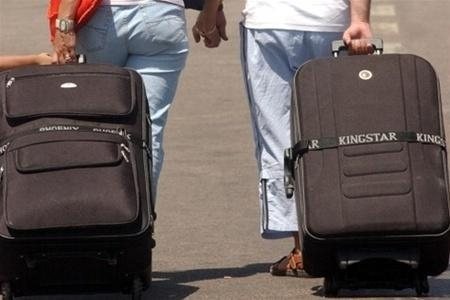
documents, which include:
- Application – a questionnaire in the prescribed form, filled out in 2 copies.
- Passport or other identification document, birth certificates of minor children.
- If there are relatives in the territory of the Republic of Kazakhstan who need guardianship and have the right to do so, their permission to leave the country must be notarized. All controversial issues that arise during the receipt of such permission are resolved only in court.
- The guardianship authorities must conclude that the relocation of children over 10 years old is carried out with their consent. This conclusion must be presented in the package of documents.
- You must submit a certificate from the military registration and enlistment office confirming de-registration and submission of your military ID.
- The state fee must be paid and a receipt for payment must be provided.
The permit is issued within a month from the date of acceptance of the package of documents.
Kazakh guest workers in Russia - how many are there really?
How many guest workers are from Kazakhstan?
On February 11, the Stratfor agency published a material about Russia’s relations with Central Asian countries, which mentioned that approximately 10% of Kazakhstanis work abroad, mainly in Russia.
Kazakhstan ranks ninth in the world in terms of the number of labor migrants, and third in the CIS after Russia and Ukraine, says the World Bank. Most migrants are from Central Asian countries. However, Kazakhstan also supplies its migrants to other countries, mainly Russia, according to the World Bank.
It is difficult to find statistics on the number of labor migrants with Kazakh citizenship in Russia, apparently due to the small number of them. Radio Azattyk was unable to comment on the figures and the International Organization for Migration (IOM) in Moscow, referring to the website of the Federal Migration Service. The site refers to data from the Central Data Bank for Registration of Foreign Citizens and Stateless Persons (CDDUIG).
According to these statistics, in 2010, more than 13.6 million foreigners entered the territory of the Russian Federation, and about 2.4 million foreigners entered the Moscow region. Most foreign citizens in 2010 arrived from the CIS countries. Two million 856 thousand people arrived from Ukraine, which is almost 21% of the total number of those who entered. One million 906 thousand people, or 14%, came from Uzbekistan.
One million 306 thousand people entered Russia from Kazakhstan in 2010, or 10% of the total number of arrivals, these data show.
952 thousand people, or 7%, arrived from Tajikistan, 816 thousand, or 6%, from Azerbaijan, and 680 thousand people, or 5% of the total number of those who entered, from Moldova. This data was provided by Alexandre Latsa, a French journalist who lives in Russia and works at the Institute of Strategic and International Relations (IRIS).
Interesting figures are provided by the Russian website Slon.ru from the report of the Eurasian Development Bank (EDB) “Labor migration in the SES”:
“According to EDB calculations based on an analysis of migrants’ remittances to their homeland, the total number of illegally working migrants from Tajikistan, Kyrgyzstan, Kazakhstan and Belarus alone in the Russian Federation in 2010 ranged from 312,000 to 1,224,000 people.”
It further says that in order to assess the economic consequences of the influx of labor migrants, the EDB analyzed Russia's need for migrants by industry and the preferences of the migrants themselves in these industries. Thus, migrants from Kazakhstan, according to their calculations, will prefer agriculture, fishing, mining and employment in the transport system, from Kyrgyzstan - forestry, manufacturing and mechanical engineering, from Tajikistan - wholesale trade. According to EDB estimates, we can ultimately expect an increase in the number of legal migrants from Kazakhstan by 47 thousand people, from Kyrgyzstan by 360 thousand people, and from Tajikistan by 890 thousand people.
What do Kazakh official data say? (Other, alternative statistics about this situation are not publicly available.) Recently, the Kazakhstan Statistics Agency reported that compared to January-December 2010, the number of arrivals to Kazakhstan in 2011 decreased by 8.9%, and the number of departures from Kazakhstan increased by 22.8%.
“In January - December 2011, the country had a positive migration balance of 5.4 thousand people. Compared to January - December 2010, the number of arrivals to Kazakhstan decreased by 8.9%, and the number of departures from Kazakhstan increased by 22.8%. The main migration exchange of the country occurs with the CIS countries,” says a press release from the statistical agency.
Kazakhstanis go to work abroad, including to Russia, but there is no exact data on the number of such labor migrants.
Damir, a Kazakh citizen who has been working in Moscow for four years, explained the reasons that prompted him to live in Russia.
Nomad in Moscow
— How did it happen that I live in Russia? First, I came for an internship: I was invited to work for a year at an international NGO, and I came after studying in Britain. The choice was not entirely conscious - partly by chance, partly by interest: I have never lived in Russia and have not even been; just one week, when I was 16 years old and stopped on my way to America,” says Damir, a young ethnic Kazakh who has been living in Moscow for four years.
“Russia was interesting,” continues Damir. “We, Kazakhs, to some extent belong to this culture, and at the same time we do not belong.” There was an interest in seeing Russia as it is. Not to say that I came to join Russian culture, and not to say that I am now closer to Russian culture. But even without living in it, it was still a part of me. Whether you like it or not, Kazakhs have become victims of Russification: many of us are Russian-speaking people, went to Russian school and in some part belong to this culture. It's not that I feel different in Russia. I feel different in Kazakhstan, and in England, in America, and in Russia. I won’t say that I can definitely attribute myself to any cultural layer. Living in Kazakhstan, sometimes you don’t understand people and some cultural features. In this sense, Kazakhstan is a sick society, a divided society. My mother, for example, does not know the Kazakh language at all, although her grandmother knows both Kazakh and Russian perfectly well. But my mother grew up in Almaty without knowing the Kazakh language, and I grew up without knowing the Kazakh language. I was even sent to a Kazakh school, where no one spoke to me, because I did not know Kazakh, that is, I was in Kazakhstan, in a Kazakh school, but as if in another country.
In Moscow, I don’t really feel like a Kazakh... It happens that people come and their national feelings become aggravated, especially people from former colonies who come to the metropolis. I didn't have that feeling. I am Kazakh and will always think of myself as Kazakh, but this is not the only factor that defines me.
It is not difficult to find a job in Moscow, not as difficult as in the West and especially in Spain, Greece and Italy. There is work, the unemployment rate is low relative to the rest of the world. On January 1, 2012, the rules changed for Kazakhstanis; previously it was necessary to obtain a work permit, and the employer had to take care of this. The second stage of the Customs Union came into force this year, and freedom of movement of goods and labor was declared. From January 1, citizens of Kazakhstan and Belarus do not need a work permit to work in Russia, and vice versa. That is, you work like a Russian. Previously, you had resident status if you lived more than 180 days a year. I don't know how relevant these rules are. I was offered to make contributions to the pension fund, but I refused.
I’ve been here for four years now and I’m thinking about moving on somewhere else. The only thing that would guide me is the idea that I would not go to where I used to live. This excludes Kazakhstan, Britain, and Russia. We are essentially nomads, I want to remain a nomad.
Economically, my salary is above average, I can afford an apartment in the center of Moscow, and I have enough for other things. But the issue of apartments in Moscow is always on the agenda: most people are visitors. I can’t speak on behalf of other Kazakhs; I was probably lucky with my job. The economic factor was a factor, but it was not the key one.
Kazakhs are not economic migrants in Russia at all; I have met only a few here: one or two guys from Kazakhstan. They usually say: Moscow is a normal city, but they don’t see themselves living here.
I agree, Moscow is not a very cozy city to live in, it’s not for everyone, of course. What I personally like about Moscow is that there is an element of unpredictability here, unlike boring America. As a political scientist, I find it interesting here, there is interesting politics here, not boring, it’s interesting to watch events. Moscow is, in principle, a European city. There's nothing here that you couldn't buy if you had the money living in New York.
Voting with your feet
This is a portrait of one emigrant, a young man of 30 years old, with a higher education received in Europe, who has the opportunity to work in different countries, and is in no hurry to return home. It is clear that Damir, as a Russian-speaking Kazakh, has a feeling that he does not belong to modern Kazakhstan and does not associate himself with its development.
A year ago, the Russian Novaya Gazeta on Facebook conducted a survey of Russians who had gone abroad, because since 2008, about 1.25 million people of the economically active population have left Russia. As it turned out, Russians abroad are not people fleeing the regime, and not Moscow moneybags, but young people with income, on average up to 35 years old, highly qualified specialists who do not want to integrate into the system and do not agree with its structure.
A portrait of one Kazakh emigrant shows that, like Russian emigrants, Kazakh “travelers” go not only to earn money, but also to fulfill themselves, out of interest. However, as in the case of Damir, there is added to this the factor of language and the feeling that, as a Russian speaker, he may feel like a stranger both at home and abroad.
Perhaps Damir is a classic example of a brain drain, when, as they say, first the golden heads, and then the golden hands, first flee from a crisis country.
